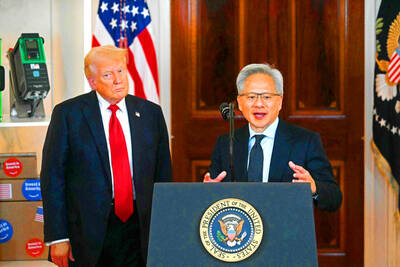Macronix International Co Ltd (旺宏電子) expects consumer demand to start picking up in the second half of this year amid increasing signs of easing tensions between the US and China, a company executive said yesterday.
As the world’s two biggest economies resumed trade talks this week in an attempt to resolve their trade disputes, the memorychip maker believes that a deal is starting to take shape, which would eventually lead to the cancelation of punishing tariffs and the removal of trade barriers, Macronix founding chairman Miin Wu (吳敏求) said.
As long as the trade war settles, “almost all businesses will return to normal as the uncertainty vanishes,” although the strength of the recovery remains to be seen, Wu said.
Consumer electronics would be the early beneficiary from the recovery of consumer confidence, while smartphone demand should bounce back in the second half of this year, he said.
The company’s outlook for the first two quarters of the year remains bleak, as most clients are conservative about placing orders for fear of building excessive inventories, he added.
“Business [prospects] will remain weak before June,” Wu said.
As of Dec. 31 last year, Macronix’s inventories swelled to NT$17.95 billion (US$582.32 million), compared with NT$9.87 billion at the end of 2017.
A bulk of the inventories have been prepared for its top client during the peak season in the second half of this year based on the customer’s sales forecast, Wu said.
The client has a good track record in absorbing inventories, he said.
The US-China trade war has dealt a blow to prices for NOR and NAND flash memory chips, Wu said.
Prices for low-end memory chips made primarily by Chinese firms have plunged by a double-digit percentage since the beginning of the year, he said.
Macronix has shifted focus away from such products due to their price volatility, he added.
Despite the difficult period, Macronix would be on track to expand its capacity to produce 19-nanometer chips, Wu said.
The company would also continue investing in research and development, he said.
The Hsinchu-based chipmaker last month saw revenue tumble approximately 20 percent to NT$1.81 billion, from NT$2.26 billion in January. That represented an annual decline of 33.6 percent.

Taiwan Semiconductor Manufacturing Co (TSMC, 台積電) last week recorded an increase in the number of shareholders to the highest in almost eight months, despite its share price falling 3.38 percent from the previous week, Taiwan Stock Exchange data released on Saturday showed. As of Friday, TSMC had 1.88 million shareholders, the most since the week of April 25 and an increase of 31,870 from the previous week, the data showed. The number of shareholders jumped despite a drop of NT$50 (US$1.59), or 3.38 percent, in TSMC’s share price from a week earlier to NT$1,430, as investors took profits from their earlier gains

AI TALENT: No financial details were released about the deal, in which top Groq executives, including its CEO, would join Nvidia to help advance the technology Nvidia Corp has agreed to a licensing deal with artificial intelligence (AI) start-up Groq, furthering its investments in companies connected to the AI boom and gaining the right to add a new type of technology to its products. The world’s largest publicly traded company has paid for the right to use Groq’s technology and is to integrate its chip design into future products. Some of the start-up’s executives are leaving to join Nvidia to help with that effort, the companies said. Groq would continue as an independent company with a new chief executive, it said on Wednesday in a post on its Web

CHINA RIVAL: The chips are positioned to compete with Nvidia’s Hopper and Blackwell products and would enable clusters connecting more than 100,000 chips Moore Threads Technology Co (摩爾線程) introduced a new generation of chips aimed at reducing artificial intelligence (AI) developers’ dependence on Nvidia Corp’s hardware, just weeks after pulling off one of the most successful Chinese initial public offerings (IPOs) in years. “These products will significantly enhance world-class computing speed and capabilities that all developers aspire to,” Moore Threads CEO Zhang Jianzhong (張建中), a former Nvidia executive, said on Saturday at a company event in Beijing. “We hope they can meet the needs of more developers in China so that you no longer need to wait for advanced foreign products.” Chinese chipmakers are in

POLICY REVERSAL: The decision to allow sales of Nvidia’s H200 chips to China came after years of tightening controls and has drawn objections among some Republicans US House Republicans are calling for arms-sale-style congressional oversight of artificial intelligence (AI) chip exports as US President Donald Trump’s administration moves to approve licenses for Nvidia Corp to ship its H200 processor to China. US Representative Brian Mast, the Republican chairman of the US House Committee on Foreign Affairs, which oversees export controls, on Friday introduced a bill dubbed the AI Overwatch Act that would require the US Congress to be notified of AI chips sales to adversaries. Any processors equal to or higher in capabilities than Nvidia’s H20 would be subject to oversight, the draft bill says. Lawmakers would have